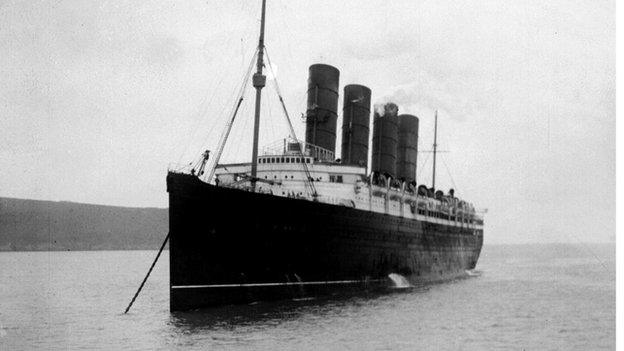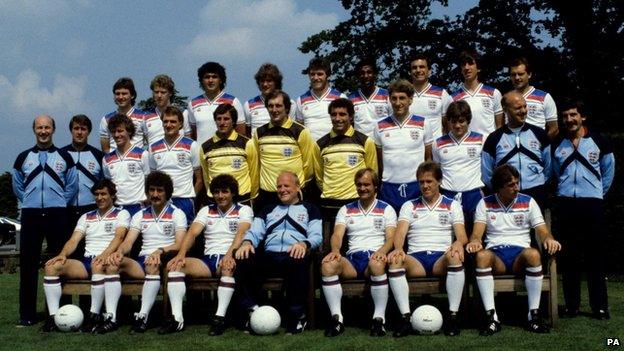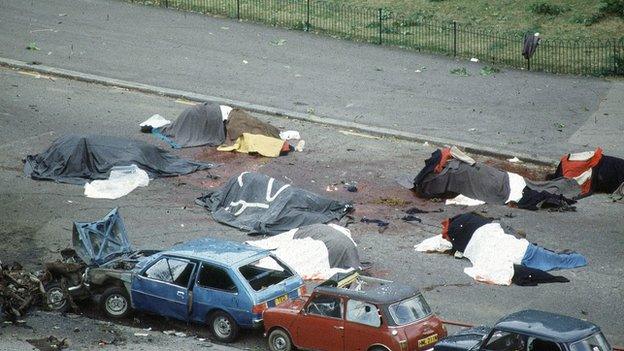Files show confusion over Lusitania sinking account
- Published

The sinking of the Lusitania was one of the most controversial incidents of World War 1
UK government officials had misgivings about a historical British account of the sinking of RMS Lusitania, files released by the National Archives show.
The ship was torpedoed off the coast of Ireland by a German U-boat in 1915, killing 1,198 people.
Germany claimed the ship was carrying explosives but UK officials said there was no record of such a cargo.
Now files from 1982 show confusion in government departments about whether those earlier statements were accurate.
One official at the Foreign & Commonwealth Office (FCO) feared the "subject may yet - literally - blow up on us".
The FCO files from 1982 have been made available online by the National Archives.
Other files show:
Environment Secretary Michael Heseltine believed England, Scotland and Northern Ireland should be prepared to pull out of the 1982 World Cup in Spain at short notice if the Falklands War escalated
Prime Minister Margaret Thatcher was asked by members of the public to reintroduce the death penalty after the Hyde Park and Regent's Park bombings
Ronald Reagan promised Mrs Thatcher support to eradicate terrorism after the attack.
'War material'
The sinking of the Lusitania on 7 May 1915 was one of the most controversial episodes of WW1.
Germany said the action was justified because the ship was "carrying large quantities of war material".
The British said there were 5,000 cases of small arms ammunition among the cargo, but insisted there was no record of explosives.
However, rumours about the ship's cargo continued to circulate, partly because the vessel had sunk quickly, before many of those on board were able to escape.
It was claimed that explosives on board caused a big secondary explosion after the torpedo strike, contributing to the speed of the sinking.
Salvage plan
The newly released documents show the issue resurfaced in 1982 when a salvage company announced plans to explore the ship's wreck.
One official from the North America department at the FCO, identified as NH Marshall, said it was a "fact" that there was "a large amount of ammunition in the wreck, some of which is highly dangerous".
He said the salvage company should be told of this in the interests of safety.
"Although there have been rumours in the press that the previous denial of the presence of munitions was untrue, this would be the first acknowledgement of the facts by HMG [Her Majesty's Government].
He also speculated that the "subject may yet - literally - blow up on us".
Another official, PHC Eyers, who was based in Ireland, said there were "no records of the Lusitania carrying any explosives or munitions otherwise".
But he agreed the salvage team should be made aware of suggestions to the contrary.
'Political ramifications'
Harry Nicholson, a Ministry of Defence official, added: "In view of the rumours, well-known I believe in salvage circles, and the purpose of the project, we consider that the organisers and participants should be warned of the risk they may be taking."
Meanwhile a Treasury official identified as Jim Coombes contacted the FCO to warn them that, even in the 1980s, there could still be political ramifications if it was admitted that explosives had been on board.
"It cannot be denied that the sinking of the Lusitania did much to sway American opinion in favour of entering the war," he wrote.
"If it were now to come to light that there was after all some justification, however slight, for the torpedoing, HMG's relations with America could well suffer."
The FCO's legal department said there was not the "remotest chance" of Britain being held liable for the loss of American lives so many years later.
Commenting on the files, Mark Dunton, a contemporary specialist at the National Archives, said they showed a "desire [by officials] to err on the side of caution".
A number of divers have surveyed the wreck, but no explosives have ever been found.

World Cup

1982 was England's first World Cup in 12 years
Released documents also show how seriously the UK government considered asking the English, Scottish and Irish football associations to boycott the 1982 World Cup in Spain in response to the Falklands War.
A paper prepared by then environment secretary Michael Heseltine in May 1982 recommends the possibility of withdrawal should remain open if the conflict escalated.
Mr Heseltine writes that the implications for the associations would be "considerable" and could bankrupt the Scottish FA and Irish FA.
He suggests the conflict could lead to "provocation of British supporters" at the event.
Other files show officials considered it could increase the risk of hooliganism.
Mr Heseltine says football authorities "have so far adopted a highly responsible attitude and have indicated that they would follow a government call for a boycott".
But he warns a boycott would be seen as a moral victory for Argentina and could damage relations with Spain.
He adds: "My present view is that HMG [Her Majesty's Government] should not yet suggest withdrawal to the football authorities, but we should be ready to adopt that course, at short notice if the situation worsens, and in light of public opinion."
Previous documents released at the National Archives disclosed that the cabinet had discussed the issue and were told some players felt "revulsion" at the idea of competing alongside Argentina.
The teams did eventually participate in the event and Argentina surrendered just as the tournament was starting.

IRA attacks
The files also give an insight into government reaction to IRA bombings in Hyde Park and Regent's Park in London.
Prime Minister Margaret Thatcher told MP Ralph Howell in August 1982 that the government was ready to look "at any proposals which would help" police investigating the attacks.

Mrs Thatcher said she shared public "horror and anger" over the bombings.
But she rejected calls from members of the public for passport controls between the UK and Ireland, telling an MP that "rigorous" controls already existed under the Prevention of Terrorism Act.
She also rejected a call for a referendum to be held on reintroducing the death penalty after the bombings.
In a letter to Mrs Thatcher, then US President Ronald Reagan called those behind the attacks "cowardly".
He also promised "continuing cooperation to eradicate terrorism worldwide".
- Published11 January 2011
- Published28 December 2012
